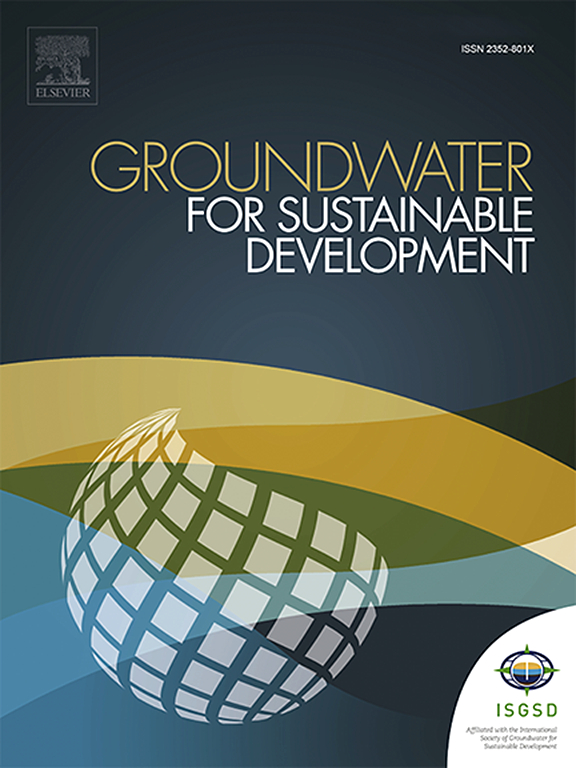推进地下水可持续性:结合水化学分析、污染缓解和基于社区的水资源治理的战略
IF 4.9
Q2 ENGINEERING, ENVIRONMENTAL
引用次数: 0
摘要
本文研究了地球化学和人为过程对水成分的影响,评估了新兴技术(主要是机器学习)在水质评估中的潜力,并强调了社区参与地下水监测和管理的重要性。水质是由水岩相互作用等自然因素和包括农业活动在内的人为活动共同决定的。了解调节水成分的地球化学因素对可持续管理至关重要。地下水化学及其演化和质量的研究对于发现变化和指导有效的管理策略至关重要。机器学习技术为评估水质和识别地下水位提供了经济可靠的工具。对流域管理采取整体办法,强调社区参与和实施最佳做法,对改善水质和确保长期可持续性至关重要。此外,必须有支持性的法律框架,以促进社区推动的保护水资源的努力,特别是通过加强废水处理和卫生措施。这篇综述旨在弥合机器学习在水质评估中的应用与社区参与在监测和管理地下水资源中的关键作用之间的差距。本文章由计算机程序翻译,如有差异,请以英文原文为准。

Advancing groundwater sustainability: Strategy combining hydro-chemical analysis, pollution mitigation, and community-based water resource governance
This review examines the impact of geochemical and human-induced processes on water composition, evaluates the potential of emerging technologies mainly machine learning for water quality assessment, and underscores the importance of community engagement in groundwater monitoring and management. Water quality is shaped by both natural factors, such as water-rock interactions, and anthropogenic activities, including agricultural practices. Understanding the geochemical factors that regulate water composition is critical for sustainable management. The study of groundwater chemistry, its evolution, and quality is pivotal for detecting changes and guiding effective management strategies. Machine learning techniques offer cost-efficient and reliable tools for evaluating water quality and identifying groundwater zones. A holistic approach to watershed management, emphasizing community involvement and the implementation of best practices, is vital to improving water quality and ensuring long-term sustainability. Additionally, supportive legal frameworks are necessary to promote community-driven efforts in protecting water resources, particularly through enhanced wastewater treatment and sanitation measures. This review aims to bridge the gap between the application of machine learning in water quality assessment and the crucial role of community engagement in monitoring and managing groundwater resources.
求助全文
通过发布文献求助,成功后即可免费获取论文全文。
去求助
来源期刊

Groundwater for Sustainable Development
Social Sciences-Geography, Planning and Development
CiteScore
11.50
自引率
10.20%
发文量
152
期刊介绍:
Groundwater for Sustainable Development is directed to different stakeholders and professionals, including government and non-governmental organizations, international funding agencies, universities, public water institutions, public health and other public/private sector professionals, and other relevant institutions. It is aimed at professionals, academics and students in the fields of disciplines such as: groundwater and its connection to surface hydrology and environment, soil sciences, engineering, ecology, microbiology, atmospheric sciences, analytical chemistry, hydro-engineering, water technology, environmental ethics, economics, public health, policy, as well as social sciences, legal disciplines, or any other area connected with water issues. The objectives of this journal are to facilitate: • The improvement of effective and sustainable management of water resources across the globe. • The improvement of human access to groundwater resources in adequate quantity and good quality. • The meeting of the increasing demand for drinking and irrigation water needed for food security to contribute to a social and economically sound human development. • The creation of a global inter- and multidisciplinary platform and forum to improve our understanding of groundwater resources and to advocate their effective and sustainable management and protection against contamination. • Interdisciplinary information exchange and to stimulate scientific research in the fields of groundwater related sciences and social and health sciences required to achieve the United Nations Millennium Development Goals for sustainable development.
 求助内容:
求助内容: 应助结果提醒方式:
应助结果提醒方式:


